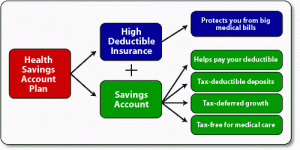Q: What is the difference between my plan and an HSA qualified plan?
A: A Colorado HSA qualified health insurance plan doesn’t have copays on doctor visits and prescription drugs before the deductible. Instead, these services are applied toward your deductible along with surgeries, testing, etc. This extra exposure on the small stuff gives you huge premium savings. The way most Colorado residents use health insurance, they end up saving a LOT more in premiums than they end up paying for these small, routine visits.
Q: What is the benefit of an HSA over just getting a cheaper plan?
 A: A Colorado HSA is more than just a cheaper option, it can provide many tax benefits if you choose to open the Health Savings Account along with the HSA qualified health insurance plan. The money you save in premium by having the HSA qualified health insurance plan can be put into the tax-qualified savings account. The money you put into that health savings account is “above the line”, so it can be deducted without being itemized and will directly reduce your income. You can then use this money to cover your healthcare expenses, whether you’re in Colorado or not, that help you meet your deductible or non-covered healthcare expenses. Any money in the account that you don’t use will roll over from year to year and accumulate interest.
A: A Colorado HSA is more than just a cheaper option, it can provide many tax benefits if you choose to open the Health Savings Account along with the HSA qualified health insurance plan. The money you save in premium by having the HSA qualified health insurance plan can be put into the tax-qualified savings account. The money you put into that health savings account is “above the line”, so it can be deducted without being itemized and will directly reduce your income. You can then use this money to cover your healthcare expenses, whether you’re in Colorado or not, that help you meet your deductible or non-covered healthcare expenses. Any money in the account that you don’t use will roll over from year to year and accumulate interest.
Even if you choose not to open the health savings account along with the HSA qualified health insurance plan (only about half of Insurance Shoppers clients in Colorado do), the benefit is that you are only paying premiums to the insurance company to just insure large claims after your chosen deductible (the definition of insurance) and maybe cover some preventive care before the deductible and not paying to have copays on doctors visits or prescription drugs (which is a waste of money).
Q: Can I get an HSA qualified plan that has copays for doctor visits or Rx?
A: No. To be HSA qualified, a plan cannot have copays for doctor visits or prescription drugs. However, preventive coverage is allowed to be covered before the deductible.
Q: I have a high deductible plan right now that doesn’t cover doctor visits or Rx, can I set up an HSA?
A: Not always. If you don’t see “Qualifying High Deductible Health Plan” or something that mentions IRC Section 223 on the declaration page of your policy, your plan is probably not HSA qualified. There are a lot of high deductible plans without copays that aren’t HSA qualified. To be HSA qualified (in 2008), a plan must have a minimum deductible of $1,100 for individuals and $2,200 for family coverage. For families, the deductibles are per family and not per person. The maximum out-of-pocket (including deductibles and coinsurance) is $5,600 for individuals and $11,200 for families. To find out if your current plan is HSA qualified, contact us if you are a Colorado resident to have us review it further.
Q: I’ve checked everything and my plan meets all the requirements to be HSA qualified, but there isn’t anything that says it is qualified!?
A: The most obvious differences are the per person deductibles and mandated coverages that may meet Colorado state insurance laws but are not qualified under federal HSA laws. But even non-HSA qualified plans that meet these standards may not qualify because the Colorado health insurance company must report the list of qualifying HSA policyholders to the IRS on a regular basis. Because of these details there may be some policies that are not legally declared as HSA qualified, even though they technically fit the requirements.
Q: My friend said HSAs are always the best choice, but I’m not sure if it would work best for me?
A: Despite what you may hear, there aren’t any plan types that work best for everybody. Depending on how you use healthcare, there may be non-HSA qualified plans that would give you less exposure than HSA qualified plans.
As a basic rule of thumb, an HSA will typically benefit you if you use your health insurance a LOT or hardly ever.
To be sure you get the best Colorado health insurance plan for your specific situation, contact us to discuss your individual needs.
Q: I would like an HSA qualified plan, but I can’t afford to pay full price for doctor visits and prescriptions.
A: Although doctors visit and Rx expenses seem like a large exposure at first, you may find that you will save so much more in premium than you could ever imagine paying in a doctor visit and Rx expenses for a year – that it is an obvious choice. If you’re a Colorado resident, give us a call to discuss your situation and we can help you do the math to see what type of plan you would benefit the most from.
Q: How much can I contribute to my HSA?
A: In 2021, contributions are capped at $3,600 for individuals and $7,200 for families. The allowable contribution amount will change every year on January 1st based on changes in the Consumer Price Index, or CPI. If you’re over 55, you can also contribute additional “catch up” contributions. To see how much extra you can contribute, read more about catch up contributions.
Q: If I’ve been putting money into my health savings account, then switch to health insurance that isn’t HSA qualified, what happens to the money in my HSA?
A: The health savings account is still yours and you can either keep the money in there to keep building interest for your retirement, or you can still use the money in the HSA to pay for qualified medical expenses. You just aren’t allowed to contribute any money into your HSA if you don’t have an HSA qualified health insurance plan.
Q: I was wondering how we file claims for the insurance with an HSA. Do we pay when we go to the Dr’s office or do they take our card and then bill us?
A: It depends on the provider. All of them will say they want the payment right away. But most of them will be happy to bill the insurance company and wait for an explanation of benefits (EOB) and then send you a bill based on that. (The EOB shows the final reduced price and what is your responsibility)
However, some providers won’t provide the service until you’ve paid (like for an MRI). If they’re this strict about it, they’ve usually got good communication with the insurance company about what the negotiated rate is and will give you an accurate price. Just make sure to check the EOB to make sure it matches what you paid and what went toward the deductible. In this case, it’s handy to have your check or debit card from your HSA provider handy. Or, you can put it on your credit card and reimburse that account from the HSA later.
Q: Can my husband’s employer deposit contributions directly into our HSA account tax-free? Or do we deduct the amount in the account on our taxes at year-end?
A: Contributions from your employer can be made to HSAs on either after-tax or pre-tax basis. If made on an after-tax basis they should be counted as an above-the-line deduction on your tax return, effectively making your contributions tax-free. If your employer would rather make the contribution pre-tax, it can be done through a Section 125 (also called a “salary reduction” or “cafeteria plan”). If you’re paying for your own individual plan and the employer is depositing money into your HSA as a benefit, they will need to put it in on an after-tax basis and you’ll need to take the deduction on your tax return.


